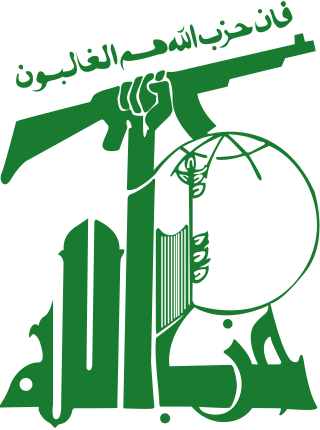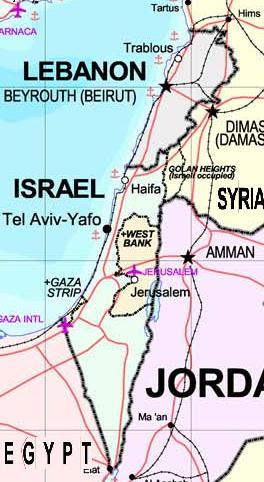
Hezbollah is a Lebanese Shia Islamist political party and militant group, led since 1992 by its Secretary-General Hassan Nasrallah. Hezbollah's paramilitary wing is the Jihad Council, and its political wing is the Loyalty to the Resistance Bloc party in the Lebanese Parliament. Its armed strength is assessed to be equivalent to that of a medium-sized army.
This is a timeline of events related to the 2006 Lebanon War.
Military operations of the 2006 Lebanon War refer to armed engagements initiated by Israel and Lebanese Hezbollah during the 2006 conflict.

The Israeli–Lebanese conflict, or the South Lebanon conflict, is a series of military clashes involving Israel, Lebanon and Syria, the Palestine Liberation Organization, as well as various militias and militants acting from within Lebanon. The conflict peaked in the 1980s, during the Lebanese Civil War, and has abated since.

The South Lebanon conflict, designated by Israel as the Security Zone in Lebanon Campaign, was a protracted armed conflict that took place in southern Lebanon from 1985 to 2000. It saw fighting between Israel and the Catholic Christian-dominated South Lebanon Army (SLA) against Hezbollah-led Shia Muslim and left-wing guerrillas within the Israeli-occupied "Security Zone"; the SLA had military and logistical support from the Israel Defense Forces over the course of the conflict and operated under the jurisdiction of the Israeli-backed South Lebanon provisional administration, which succeeded the earlier Israeli-backed State of Free Lebanon. It can also refer to the continuation of the earlier conflict in this region involving the growing Palestinian insurgency in South Lebanon against Israel following the expulsion of the Palestine Liberation Organization (PLO) from Jordan after Black September. Historical tensions between Palestinian refugees and Lebanese factions contributed another layer to the Lebanese Civil War (1975–1990), which saw the Maronite-led Lebanese Front and the Shia Amal Movement at war with the PLO. Hence, the South Lebanon conflict can partly be seen as an extension of the civil war that ended in 1990.

The Battle of Bint Jbeil was one of the main battles of the 2006 Lebanon War. Bint Jbeil is a major town of some 20,000 inhabitants in Southern Lebanon. Although Brig.-Gen. Gal Hirsch announced on 25 July that the Israel Defense Forces (IDF) had "complete control" of Bint Jbeil, this statement was later discredited. In spite of three sustained attempts by the IDF to conquer the town, it remained in the hands of Hezbollah until the end of the war. The town was the scene of some of the fiercest fighting of the war, with both sides taking heavy losses. Three senior Israeli officers, including Major Roi Klein, were killed in the battle. Hezbollah similarly lost several commanders, most notably Khalid Bazzi, commander of the Bint Jbeil area.

The 2006 Hezbollah cross-border raid was a cross-border attack carried out by Lebanon-based Hezbollah militants on an Israeli military patrol on 12 July 2006 on Israeli territory.

The 2006 Lebanon War, also called the 2006 Israel–Hezbollah War and known in Lebanon as the July War and in Israel as the Second Lebanon War, was a 34-day military conflict in Lebanon, northern Israel and the Golan Heights. The principal parties were Hezbollah paramilitary forces and the Israel Defense Forces (IDF). The conflict started on 12 July 2006, and continued until a United Nations-brokered ceasefire went into effect in the morning on 14 August 2006, though it formally ended on 8 September 2006 when Israel lifted its naval blockade of Lebanon. Due to unprecedented Iranian military support to Hezbollah before and during the war, some consider it the first round of the Iran–Israel proxy conflict, rather than a continuation of the Arab–Israeli conflict.

United Nations Security Council Resolution 1701 is a resolution that was intended to resolve the 2006 Lebanon War. The resolution calls for a full cessation of hostilities between Israel and Hezbollah, the withdrawal of Israeli forces from Lebanon to be replaced by Lebanese and UNIFIL forces deploying to southern Lebanon, and the disarmament of armed groups including Hezbollah. It emphasizes Lebanon's need to fully exert government control and calls for efforts to address the unconditional release of abducted Israeli soldiers.
Hezbollah has a military branch and is the sponsor of a number of lesser-known groups, some of which may be little more than fronts for Hezbollah itself. These groups include the Organization of the Oppressed, the Revolutionary Justice Organization, the Organization of Right Against Wrong, and Followers of the Prophet Muhammad.
During the 2006 Lebanon War, allegations of war crimes were made by various groups and individuals, including Amnesty International, Human Rights Watch, and United Nations officials, who accused both Hezbollah and Israel of violating international humanitarian law. These have included allegations of intentional attacks on civilian populations or infrastructure, disproportionate or indiscriminate attacks, the use of human shields, and the use of prohibited weapons.

Israeli casualties of war, in addition to those of Israel's nine major wars, include 9,745 soldiers and security forces personnel killed in "miscellaneous engagements and terrorist attacks", which includes security forces members killed during military operations, by fighting crime, natural disasters, diseases, traffic or labor accidents and disabled veterans whose disabilities contributed to their deaths. Between 1948 and 1997, 20,093 Israeli soldiers were killed in combat, 75,000 Israelis were wounded, and nearly 100,000 Israelis were considered disabled army veterans. On the other hand, in 2010 Yom Hazikaron, Israel honored the memory of 22,684 Israeli soldiers and pre-Israeli Palestinian Jews killed since 1860 in the line of duty for the independence, preservation and protection of the nation, and 3,971 civilian terror victims. The memorial roll, in addition to IDF members deceased, also include fallen members of the Shin Bet security service, the Mossad intelligence service, the Israel Police, the Border Police, the Israel Prisons Service, other Israeli security forces, the pre-state Jewish underground, and the Jewish Brigade and the Jewish Legion.
Events in the year 2006 in Israel.

The Iran–Israel proxy conflict, also known as the Iran–Israel proxy war or Iran–Israel Cold War, is an ongoing proxy conflict between Iran and Israel. In the Israeli–Lebanese conflict, Iran has supported Lebanese Shia militias, most notably Hezbollah. In the Israeli-Palestinian conflict, Iran has backed Palestinian groups such as Hamas. Israel has supported Iranian rebels, such as the People's Mujahedin of Iran, conducted airstrikes against Iranian allies in Syria and assassinated Iranian nuclear scientists. In 2018 Israeli forces directly attacked Iranian forces in Syria.
Events in the year 2015 in Israel.
The Iran–Israel conflict during the Syrian civil war refers to the Iranian–Israeli standoff in and around Syria during the Syrian conflict. With increasing Iranian involvement in Syria from 2011 onwards, the conflict shifted from a proxy war into a direct confrontation by early 2018.

On 8 October 2023, the Lebanese militant group Hezbollah, taking advantage of the Israel–Hamas war, fired guided rockets and artillery shells at Israeli positions in the occupied Shebaa Farms. Israel retaliated by launching drone strikes and artillery shells at Hezbollah positions near Lebanon's boundary with the Israeli-occupied Golan Heights. The outbreak of the conflict had followed Hezbollah's declaration of support and praise for the Hamas attack on Israel, which took place on 7 October. Clashes subsequently escalated to reach other parts of the Israel-Lebanon border and onto Syria and the occupied Golan Heights. It is currently the largest escalation of the Hezbollah–Israel conflict to have occurred since the 2006 Lebanon War.
This is a chronological timeline of the Israel–Hezbollah conflict since October 2023.









